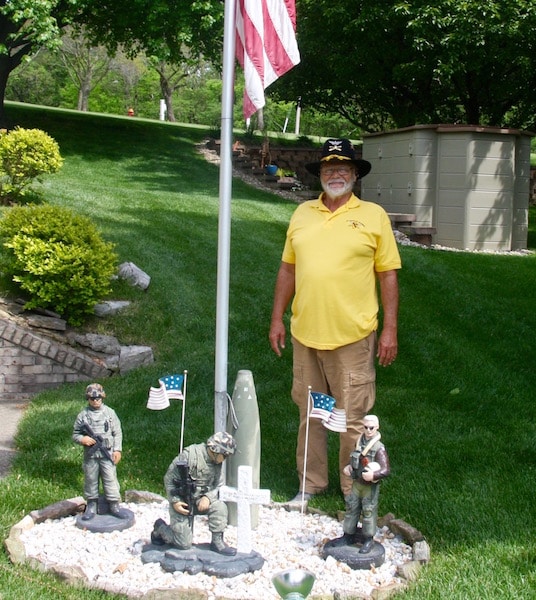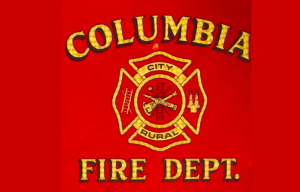Vietnam vet recounts experience

Marvin McMichael will never forget the events of Nov. 19, 1967.
The Columbia resident was in the midst of his tour of duty while with the United States Army during the Vietnam War, serving as a crew chief and door gunner on Army helicopters.
McMichael’s unit was on a gun mission, with his helicopter hovering above the jungle when an enemy soldier below started shooting at the aircraft with an AK-47.
“We didn’t even see him. We heard him first,” McMichael recalled.
Soon, debris from damage to the front of the helicopter knocked out the pilot, and the door gunner got shot in the head, falling back in his seat.
“It scared the hell out of me,” McMichael said of seeing the man next to him take a bullet to the head.
A bullet also struck a box of ammunition, sending metal shrapnel flying around the cabin of the aircraft.
Some of the shrapnel lodged in McMichael’s arm, but he did not even notice it until the co-pilot flew the helicopter out of the firefight and to the nearby hospital and he began refueling.
McMichael finished his task and went to get the wound treated, noticing the door gunner was also being worked on after he started to stir when he was removed from the helicopter.
He would soon do more than stir.
“Luckily, with the angle, it came in on that bullet, it went in right below the brim of the helmet, went around the skull and came out the back of the helmet,” McMichael said. “It never even fractured his skull, but the concussion knocked him out.”
That night, McMichael returned to his unit with the door gunner, who wore the pieces of the bullet that nearly killed him in a plastic bag on the chain with his dog tags.
That story is one of several McMichael can tell from his year serving in Vietnam, as he flew combat missions on a daily basis.
A Sparta native, McMichael volunteered for the draft in the early spring of 1966 because he found out he was going to be drafted that December.
His first day in the Army was May 10, 1966.
Following the normal training regimen, McMichael completed five days of jungle training in Vietnam before flying north to join the 1st Squadron of the 9th Cavalry Regiment.
That unit flew search and destroy and reconnaissance missions every day.
“What we would do is go out in certain areas they would set up for us where they figured the enemy was moving, and our job was to send one aircraft down in the trees and hover around looking for things while the other one flew around up top to cover,” McMichael explained. “If we could engage the enemy, our job – if it was a small group that we would take down – was to get out, strip them and bring their uniforms and things back for the intelligence people.”
McMichael’s squadron was one of the most decorated units during the war, as it is estimated it was responsible for 50 percent of all enemy soldiers killed by the 1st Cavalry Division.
“We got the nickname Headhunters,” McMichael said, adding that his unit was the basis for the squadron led by Robert Duvall’s character in the film “Apocalypse Now.”
“Basically, we would try to go in and start a fight.”
McMichael and his band of brothers did not only kill enemy combatants. On one mission, they captured more than 100 enemy troops over five days as they were protecting Green Berets working on a construction project in the jungle.
In their downtime, they gave candy and canned peaches to children of the Montagnards, an indigenous Vietnamese people who often worked with Green Berets.
“They used crossbows, blowguns and they wore loincloths,” McMichael said of that people. “They brought these little kids out (of the jungle with them). They were pretty cool. They’d never had candy, and they liked peaches.”
McMichael also endured hardships during his service – including being involved in three helicopter crashes.
One was due to a maintenance issue, while the other two happened after his aircraft took enemy fire.
In one case, a bullet hit an oil cooler, causing the engine to quit about a mile away from the battle, and, in the other, enemy troops shot the pilot. The co-pilot was able to fly a couple of miles before the aircraft went down.
Both times, the helicopter rolled over on its side after making what McMichael called a “hard landing” in a rice paddy.
After 12 months of these regular engagements, McMichael headed home.
He found out about his return in less-than-ideal circumstances, as his sergeant informed him he had 20 minutes to pack because he was flying home after the mail helicopter landed.
“All the guys were flying,” McMichael said. “I didn’t get to say goodbye to anybody. I packed it up. All I had was just my battle gear and just a few clothes. I left some of my clothes and stuff for them.”
Three days after leaving the jungle, McMichael, who earned two Bronze Star Medals, numerous Air Medals for time in combat and a Purple Heart, was on American soil.
But the war was not finished with him yet.
“I really had a problem,” McMichael shared. “I was drinking a lot. Then, I bought a Corvette, and that didn’t help. I don’t know how I survived that next little bit.”
One key factor in helping McMichael adjust to civilian life was the friends he made in his new career.
After his time in the service, McMichael used the G.I. Bill to earn an aviation degree. About two weeks after graduation, he received a call from a man he served with about a job with the 281st Assault Helicopter Company based out of Midcoast Aviation in Cahokia.
McMichael took the job, and for the next 36 years he worked for the Department of Defense through a handful of private companies, with his career focused on aviation.
“I owe the military my entire career because I found out I really like to fly, and I continued to work with them for 36 years,” said McMichael, who has been retired for 15 years. “I owe everything to the Army.”
At that first job in Cahokia, all of McMichael’s co-workers were Vietnam veterans who had seen combat, which provided him with a friendly group of people to talk to about his experience.
“We’d sit around in the break rooms at lunch and talk about it, laugh and cry about it. It was like free therapy because somebody else like you went through this. That was the best therapy I ever had,” McMichael said.
In recent years, McMichael has found a similar community at Columbia American Legion Post 581.
“I’m a late starter on that,” he noted. “I think it’s been good.”
Like many of the American Legionnaires, McMichael lost friends as a result of the war.
He has a memorial in front of his house for one of his deceased buddies, and every year he arranges rope lights in the shape of a white cross on his lawn for Memorial Day.
“I think it’s very important — Memorial Day has always been special for me,” McMichael said.






